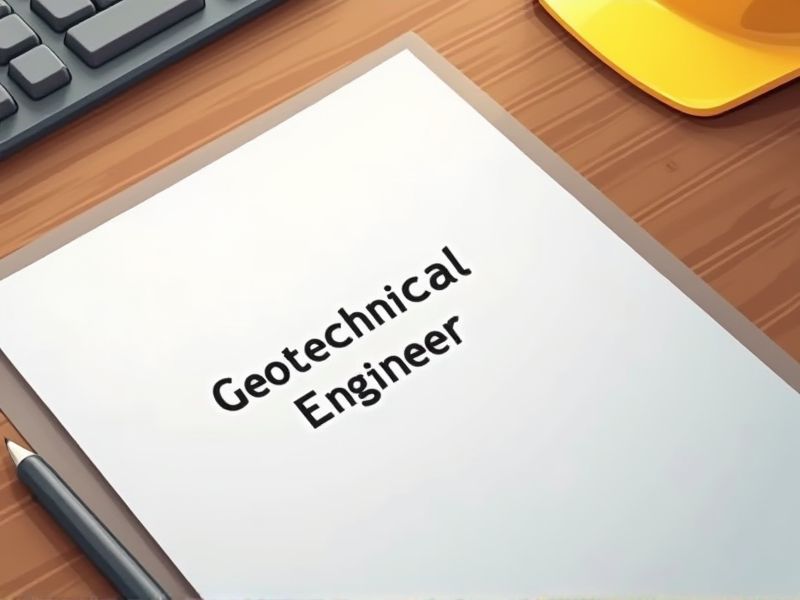
Geotechnical engineers deal with complex ground conditions that influence the safety and feasibility of construction projects. Certifications help validate their expertise in soil mechanics and foundation engineering, ensuring they meet industry standards. These credentials also enhance credibility and career opportunities, as employers often prioritize certified professionals. Essential certifications for a geotechnical engineer include those listed below.
Fundamentals of Engineering (FE)
The Fundamentals of Engineering (FE) exam is essential for Geotechnical Engineers because it serves as the first step in obtaining a Professional Engineer (PE) license, which is often required for higher responsibility positions. Passing the FE exam demonstrates a foundational understanding of key engineering principles necessary for assessing and solving geotechnical problems. Employers frequently require or prefer candidates who have passed the FE exam as it indicates a commitment to the profession and a level of competence. Obtaining a PE license, facilitated by passing the FE exam, can enhance credibility and lead to more career opportunities.
Professional Engineer (PE) License
Holding a Professional Engineer (PE) License for a Geotechnical Engineer certifies their capability to uphold safety and ethical standards, ensuring public infrastructure safety. The license is often a prerequisite for undertaking significant projects, as it validates an engineer's qualifications and expertise to employers and clients. Geotechnical Engineers with a PE License can sign and seal engineering documents, which legalizes their assessments and decisions in projects. It facilitates career advancement opportunities, as many authoritative positions require or favor licensed professionals.
Certified Geotechnical Engineer (CGE)
A Certified Geotechnical Engineer (CGE) ensures that engineering projects meet safety and quality standards, which can prevent costly failures or accidents. Obtaining certification reflects a recognized level of expertise, credibility, and commitment to professionalism in the field. Further, a CGE can provide expert judgment in complex geological conditions, influencing project success and sustainability. In competitive markets, certification can set an individual apart, proving necessary for career advancement and leadership roles.
Certified Professional in Erosion and Sediment Control (CPESC)
The CPESC certification equips geotechnical engineers with specialized knowledge in erosion and sediment control, crucial for reducing environmental impacts during construction projects. Regulatory compliance mandates many projects to have erosion and sediment control plans designed or reviewed by certified professionals, ensuring adherence to legal standards. Effective erosion control minimizes project delays and additional costs associated with non-compliance or environmental degradation. Enhancing skills in this area can also lead to more sustainable project outcomes and improved stakeholder relations, as it demonstrates a commitment to environmental stewardship.
LEED Accredited Professional (LEED AP)
Achieving LEED AP status equips a geotechnical engineer with an in-depth understanding of sustainable building practices, crucial for integrating environmentally friendly design into foundational work. This expertise helps ensure that geotechnical projects align with LEED standards, which can improve a project's eligibility for certification. Collaboration with multidisciplinary teams becomes more effective, as the engineer can readily contribute insights on sustainable materials and site strategies. With LEED knowledge, geotechnical engineers can drive innovation in sustainable construction techniques, reducing the project's overall environmental impact.
Project Management Professional (PMP)
Earning a Project Management Professional (PMP) certification equips a geotechnical engineer with crucial project management skills, enhancing their ability to oversee complex projects efficiently. PMP certification often increases credibility and trust with stakeholders, as it signifies adherence to recognized standards and methodologies. In the competitive field of geotechnical engineering, having a PMP can lead to better job opportunities and potential salary increases. Obtaining the certification can also aid in minimizing project risks and maximizing successful outcomes, which is vital in geotechnical projects where safety and precision are paramount.
OSHA 30-Hour Construction Safety Certification
Geotechnical engineers often work on construction sites, which inherently pose safety risks requiring comprehensive training like the OSHA 30-Hour Construction Safety Certification. The certification provides these engineers with knowledge on hazard recognition and prevention specific to construction environments, thereby reducing the likelihood of accidents. Safety compliance is mandated by many employers and regulatory bodies to ensure all personnel on-site understand and adhere to safety standards. An engineer with this certification is more capable of contributing to a safer work environment, which aligns with industry best practices and legal requirements.
Certified Construction Manager (CCM)
A Certified Construction Manager (CCM) enhances project coordination, which ensures that geotechnical engineering aspects align well with overall construction timelines. The CCM's expertise in risk management aids in identifying potential geotechnical issues before they escalate, thus minimizing costly setbacks. Their comprehensive project oversight fosters efficient resource allocation, optimizing geotechnical engineering outcomes. Clear communication channels established by the CCM improves collaboration between geotechnical engineers and other stakeholders, reducing misunderstandings and improving project cohesion.
Advanced Geotechnical Analysis Certification (AGAC)
Obtaining an Advanced Geotechnical Analysis Certification (AGAC) enhances a geotechnical engineer's capability to solve complex subsurface problems, directly improving project outcomes. A certified engineer typically gains a deeper understanding of soil behavior, which can minimize the risk of structural failures. AGAC holders are often preferred in specialized roles, as their expertise can lead to more accurate and sustainable designs. With this certification, engineers tend to see greater career advancement opportunities, as employers value the rigorous training associated with AGAC.
Professional Certificate in Soil Mechanics and Foundation Design
Acquiring a Professional Certificate in Soil Mechanics and Foundation Design enhances a geotechnical engineer's ability to analyze soil behavior under various conditions. Increased knowledge in foundation design leads to improved safety and stability of infrastructure projects. More in-depth understanding of soil mechanics results in more accurate predictions of soil-structure interactions. This certification can increase career opportunities by aligning skills with industry standards and demands.
Summary
When you, as a geotechnical engineer, obtain certifications, your credibility in the field significantly increases. This recognition often leads to more job opportunities and career advancements, because employers prioritize certified professionals. Additionally, certifications improve your skills and knowledge, enabling better project performance and decision-making. Your professional network expands, as certified engineers tend to connect with peers who share similar credentials.
